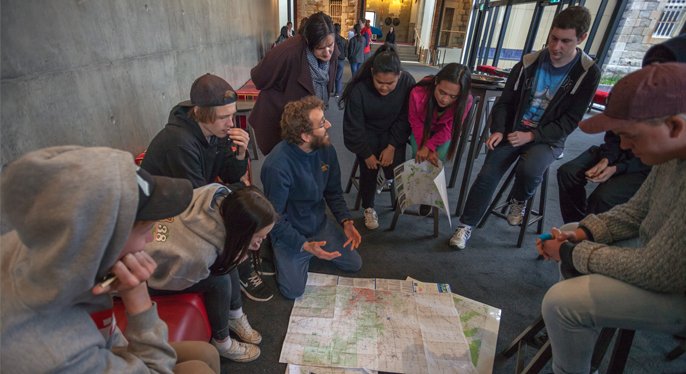A group of around 65 VCAL students are participating in an environment-focused project that has brought together Parks Victoria, the EPA of Victoria, Conservation Volunteers Australia and Sustainability Victoria.
The project is a cross-curriculum project that meets outcomes for Numeracy, Literacy, Personal Development and Work Related Skills strands.
On Thursday the focus was the movie ‘A Plastic Ocean’ which reveals not only the amount of plastic rubbish and micro-plastic particles that fill our oceans, but also the on-land problem of plastic that is presently going to landfill, when almost all of it could be profitably recycled—many times over.
“We gave into the 1950s hype that we could throw plastic away. There is no ‘away’,” the movie stresses.
One scientist explained that food really should not come into contact with any plastic. Ideally we should use paper, aluminium foil, metal or glass. Asked about the well-known plastics demon, BPA, he explained it is present in detectable levels in 92% of Americans, adding; “But just avoiding plastics with BPA is like catching Al Capone and then announcing that all criminal activity in the US has been sorted!”
During the delicious morning tea prepared by VET Hospitality students, participants reflected on what they had learnt.
“I didn’t know it was such a problem—it’s scary to think about what the world’s come to.” – Tahlia
“Honestly, I just didn’t even care about this issue because I didn’t realise the extent of it.” – Lachlan
“I knew things were bad but not on this scale. I think it’s going to be pretty hard to stop using plastics because so much depends on companies changing what they produce and how they package it.” – Douglas
“It’s disgusting. I didn’t know it was this bad, but I hope we can get this issue sorted out.” – Cheyenne
‘A Plastic Ocean’ gave students an insight into countries, companies and recycling plants that are literally changing the world: recycling plastic can happen over and over (and over!) with the products morphing from clothes to water bottles to car parts to furniture.
Applying this understanding to Bendigo’s Whipstick forest will be the focus of this VCAL project. Students will cover the ground on foot, by mountain bike and in cars; they will complete various activities including evaluating the amount, type and impact of illegal rubbish dumpings that are damaging and polluting the Whipstick. Usually there are around 50 sites any one time in the Bendigo region according to Mat Sobey, Parks Victoria Ranger Team Leader for Bendigo/Goldfields area.
Students will be involved in both rectifying the situation—such as clean-ups, tree planting and fence building—and coming up with ideas to educate the wider community about the problem. The project will also impact back at school with students selling reusable cups to raise funds for environmental organisations as well as building awareness across the school.
Adam Smolak, Regional Manager for Conservation Volunteers Australia explained that this project is unique. “Students have participated in tree planting and weed control before, but their involvement here includes both understanding why rubbish—especially plastic—is such a problem and why protecting the bush matters,” he said.











